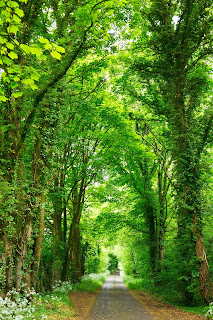ARE TREES REALLY IMPORTANT?
August 19, 2019 | Author Friend Promo
from Carol Browne
I’m a tree hugger and always have been. There’s something in my nature that draws me to them like old friends. How gratifying it is for me to see so many other people waking up to how important and precious trees are.
 |
| Photo by Studio Dekorasyon on Unsplash |
Every oxygen-breathing organism on Earth benefits from the work done by these forest denizens. Their fallen leaves not only nourish the ground they stand in but also feed a network of fungi, plants and small critters essential to the circle of life. The trees hold the land in their roots, preventing soil erosion and landslides. They suck up water and protect the land from flooding. They provide shade, shelter and homes to countless animals, birds and insects. They give us fruit, nuts and medicine; wood for building and fuel. In the rainforests they even create their own weather.
Trees are amazing. And now we need them more than ever. Their ability to capture carbon from the air, to use and store it, while releasing life-affirming oxygen, is vital in the battle against climate change.
We must plant more trees. Anyone with a garden can do that. If you can’t, donate to an organization that will plant trees on your behalf and support campaigns to protect ancient woodland.
We have lost our connection with Nature, that fellowship experienced so profoundly by our ancestors. For far too long we have looked down upon primitive cultures that talked about nature spirits and the wisdom of trees. We dismissed the Druids for worshipping trees. It was all superstition. But we were wrong. The trees have been our allies all the time, even when we turned our backs on them. They remained the guardians of the planet and quietly went about the business of preserving its ecosystem. Now it is imperative we embrace them again as our friends and rediscover that lost connection, before it is too late.
There is a close relationship between trees and writers; don’t they provide us with the paper on which we write our stories? They can even give us the ink to write them with. Ink made from oak galls was favoured by scribes during the Middle Ages and Renaissance because of its permanence and resistance to water and it still enjoys a niche market today among artists.
It is fitting, then, that my fantasy novel The Exile of Elindel opens with the main character, Elgiva, asking an oak tree for advice. As an elf she is fortunate in being able to understand the language of trees and she knows that ancient oaks are steeped in wisdom. It is this encounter at the beginning of Chapter One that determines everything that follows.
Without the tree there would be no story. Here’s an a brief intro for you.
Elgiva, a young elf banished from Elvendom, must seek shelter among the Saxons as her only hope of surviving the coming winter.
Godwin, a Briton enslaved by the Saxons, is a man ignorant of his own inheritance and the secret of power he possesses.
A mysterious enemy, who will stop at nothing to wield absolute power over Elvendom, is about to make his move.
When destiny throws Elgiva and Godwin together, they embark upon the quest for the legendary Lorestone, the only thing that can save Elvendom from the evil that threatens to destroy it.
There is help to be found along the way from a petulant pony and a timid elf boy but, as the strength of their adversary grows, can Elgiva’s friends help her to find the Lorestone before it falls into the wrong hands?
EXCERPT
The night was waning when Elgiva woke, wondering where she was. The dark ceiling of Joskin’s cave hung above her, and everything had a reddish glow, cast by the embers of the fire. She slid from under the fur coverlet, her skin tightening at the loss of its warmth, and searched for her leather sandals.
Something had woken her, something that waited outside the cave. A runnel of dread ran down her spine.
She had an inexplicable sense of impending danger, but it was too insistent to ignore. An unnamed instinct stopped her from alerting her companions. She must face this menace alone.
She left the cave as quietly as she could. Her heart pounded in her throat as she peered between the rowan trees and searched the night. Whatever had awakened her, it beckoned. She held her breath and listened, but her ears detected nothing, save for a silence as dark and empty as an abandoned crypt.
It would soon be daybreak, but the sun had yet to rise, and the dark beyond the cave swarmed with potential horrors. She stepped out from among the rowans, relying on her acute senses to make out her surroundings. An unnatural calm gripped the night and as her sandals whispered against the cold grass, they sounded abnormally loud. She feared they would betray her presence.
After a while, she came to a stop and searched the trees. Thin strands of mist curled along the ground, cold and clammy, like an exhalation of sickness.
She hugged her shoulders, knotted her fingers in the cascade of her hair, and shivered in her ragged robe. All around her, the silence seemed to be drawing into focus.
“Who is it?” Her throat was too dry for her purpose. She swallowed and licked her lips. “Who’s there? I know you’re there. I can . . . I can feel you!”
Feel you.
A flash of silver sliced through the dark, and Elgiva gasped in fear. Her arms came up to shield her face as the beam struck a rock several yards ahead. It exploded with a whoosh and sent up thousands of splinters of light, which fell to the ground and sizzled in the mist.
A shape now stood upon the rock, its form concealed in a black, hooded cloak.
Elgiva clutched the amulet to her breast. Her hands were white with terror. “In the name of Faine, who are you? What sort of trick is this?”
A soft, sly voice spoke back to her. “Why should you fear magic?”
“What do you want?” she pleaded, her voice a croak of fear.
“To see for myself.”
“To see what?”
The dark shape sniggered, but made no answer. Instead, it swept its cloak aside, and a cloud of sparks flew out and covered the ground with beads of light.
Elgiva stepped back unsteadily, resolved to flee.
“Stay!” commanded the creature.
It raised a skeletal hand, and the forefinger swung towards Elgiva and pinned her against the darkness, holding her like a rivet of bone. No elf, no wilthkin, ever owned such a hand. Her legs threatened to buckle beneath her. This had to be a nightmare; she was still asleep in the cave. But no, it was all too real.
“Who are you? What do you want?” she cried. “I have . . . I have an amulet!”
The creature laughed derisively. “I am Death, and I have come for you.”
It began to radiate a sickly green light, enveloping itself in a caul of brilliance that pulsated with force. The light grew in size until the trees behind it were bathed in its angry glare. It reached for Elgiva, like a foul stench creeping along a breeze, and she was helpless. The creature’s power throbbed in the darkness.
Within the taut coils of her fear, her instincts screamed at her to run, but her limbs had turned to stone.
Siriol, Siriol, help me . . . help . . .
With a shriek of glee, the creature increased the throb of its power. Elgiva’s mind was suddenly invaded by an inexplicable force. She became divorced from herself and watched from a great distance, waiting for the horror to unfold.
Stay connected with Carol on her website and blog, Facebook, and Twitter.






